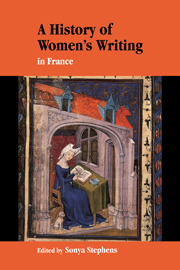Book contents
- Frontmatter
- Contents
- Notes on contributors
- Introduction
- 1 Female voices in convents, courts and households: the French Middle Ages
- 2 To choose ink and pen: French Renaissance women's writing
- 3 Altering the fabric of history: women's participation in the classical age
- 4 The eighteenth century: women writing, women learning
- 5 Eighteenth-century women novelists: genre and gender
- 6 The nineteenth century: shaping women
- 7 1900–1969: writing the void
- 8 From order to adventure: women's fiction since 1970
- 9 Changing the script: women writers and the rise of autobiography
- 10 Women poets of the twentieth century
- 11 Voicing the feminine: French women playwrights of the twentieth century
- 12 Feminist literary theory
- Bibliographies
- Index
7 - 1900–1969: writing the void
Published online by Cambridge University Press: 25 September 2009
- Frontmatter
- Contents
- Notes on contributors
- Introduction
- 1 Female voices in convents, courts and households: the French Middle Ages
- 2 To choose ink and pen: French Renaissance women's writing
- 3 Altering the fabric of history: women's participation in the classical age
- 4 The eighteenth century: women writing, women learning
- 5 Eighteenth-century women novelists: genre and gender
- 6 The nineteenth century: shaping women
- 7 1900–1969: writing the void
- 8 From order to adventure: women's fiction since 1970
- 9 Changing the script: women writers and the rise of autobiography
- 10 Women poets of the twentieth century
- 11 Voicing the feminine: French women playwrights of the twentieth century
- 12 Feminist literary theory
- Bibliographies
- Index
Summary
For women in France, the first seven decades of the twentieth century were characterized by a combination of stasis and change, of tradition and transformation. If the late 1960s and the early to mid-1970s represented a revolutionary epoch, after and as a result of which the rights and lives of French women and the contours of the condition féminine would never be the same again, the preceding years of the century were significantly less marked by radical, gender-related socio-cultural change.
In the preface to her Promenade femmilière: recherches sur l'écriture féminine (1981), Irma Garcia argues that to disassociate women's writing from (women's) history is to disregard the particularly marked imbrication of female creativity and its socio-historical context. The discussion that follows here takes its cue from Garcia's sense of the way in which women's writing and its historical environment are connected. The particular focus of this chapter is a series of selected fictional texts published by Colette, Simone de Beauvoir, Violette Leduc, Christiane Rochefort and Monique Wittig. The intention is to examine the varied accounts of gendered evolution and experience offered in these texts, and to assess the extent to which modern French women's writing is marked by the socio-historical situation in which women in France found themselves at various points in the twentieth century. It is no more possible, in a single chapter, to cover this period in its entirety than it is to address the work of all of the women authors whose literary careers coincided with these years of the twentieth century.
- Type
- Chapter
- Information
- A History of Women's Writing in France , pp. 147 - 167Publisher: Cambridge University PressPrint publication year: 2000



